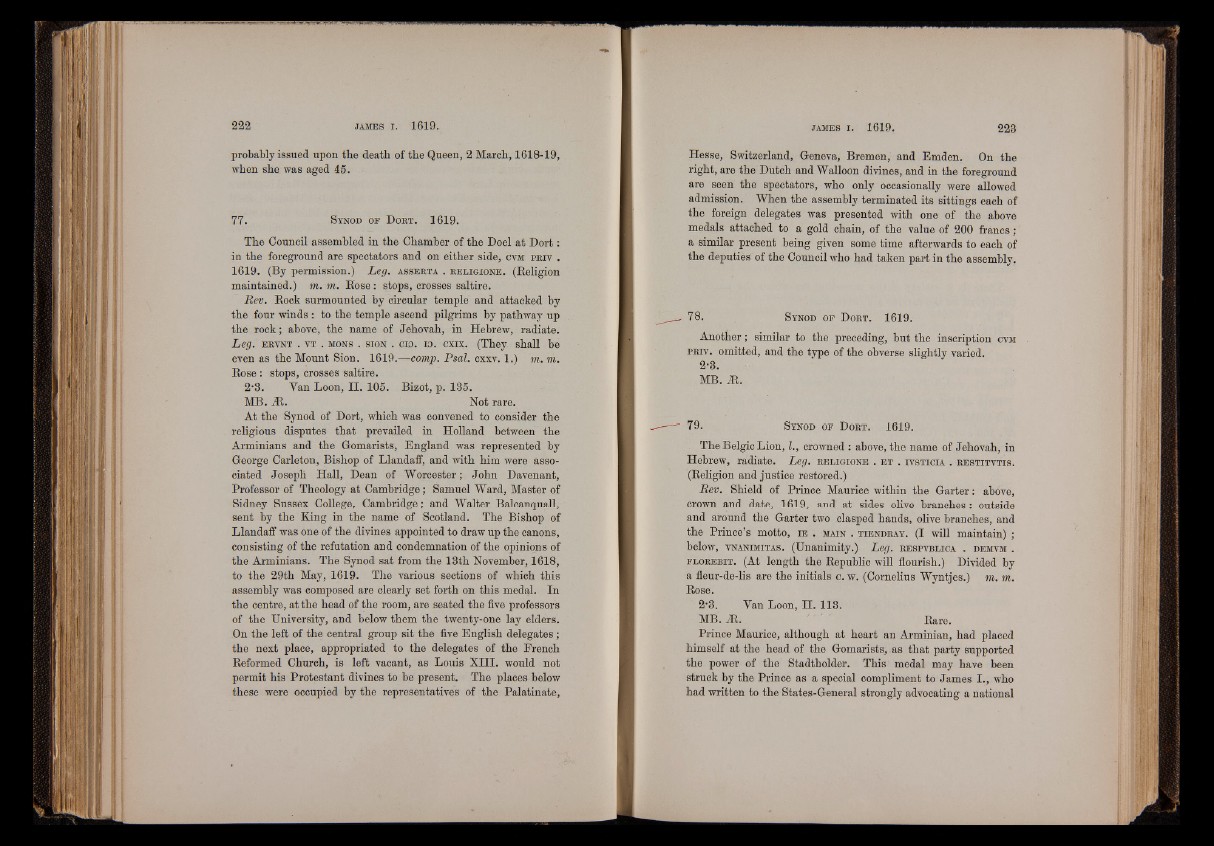
probably issued upon the death of the Queen, 2 March, 1618-19,
when she was aged 45.
77. S y n o d o p D o r t . 1619.
The Council assembled in the Chamber of the Doel at D o rt:
in the foreground are spectators and on either side, cvm p r i v .
1619. (By permission.) Leg. a s s e r t a . r e l i g i o n e . (Religion
maintained.) to. to. Rose : stops, crosses saltire.
Rev. Rock surmounted by circular temple and attacked by
the four winds : to the temple ascend pilgrims by pathway up
the rock; above, the name of Jehovah, in Hebrew, radiate.
Leg. e r v n t . v t . m o n s . s io n . oiD. id . cxix. (They shall be
even as the Mount Sion. 1619.—comp. Psal. cxxv. 1.) to. to.
Rose : stops, crosses saltire.
2-3. Yan Loon, II. 105. Bizot, p. 135.
MB. 51. Not rare.
At the Synod of Dort, which was convened to consider the
religious disputes that prevailed in Holland between the
Arminians and the Gomarists, England was represented by
George Carleton, Bishop of Llandaff, and with him were associated
Joseph Hall, Dean of Worcester; John Davenant,
Professor of Theology at Cambridge; Samuel Ward, Master of
Sidney Sussex College, Cambridge; and Walter Balcanquall,
sent by the King in the name of Scotland. The Bishop of
Llandaff was one of the divines appointed to draw up the canons,
consisting of the refutation and condemnation of the opinions of
the Arminians. The Synod sat from the 13th November, 1618,
to the 29th May, 1619. The various sections of which this
assembly was composed are clearly set forth on this medal. In
the centre, at the head of the room, are seated the five professors
of the University, and below them the twenty-one lay elders.
On the left of the central group sit the five English delegates;
the next place, appropriated to the delegates of the French
Reformed Church, is left vacant, as Louis XIII. would not
permit his Protestant divines to be present. The places below
these were occupied by the representatives of the Palatinate,
Hesse, Switzerland, Geneva, Bremen, and Emden. On the
right, are the Dutch and Walloon divines, and in the foreground
are seen the spectators, who only occasionally were allowed
admission. When the assembly terminated its sittings each of
the foreign delegates was presented with one of the above
medals attached to a gold chain, of the value of 200 francs;
a similar present being given some time afterwards to each of
the deputies of the Council who had taken part in the assembly.
78. S y n o d o e D o r t . 1619.
Another; similar to the preceding, but the inscription cvm
p r i v . omitted, and the type of the obverse slightly varied.
2-3.
MB. M.
79. S y n o d o e D o r t . 1619.
The Belgic Lion, I., crowned : above, the name of Jehovah, in
Hebrew, radiate. Leg. r e l i g i o n s . e t . i v s t i c i a . r e s t i t v t i s .
(Religion and justice restored.)
Rev. Shield of Prince Maurice within the Garter: above,
crown and date, 1619, and at sides olive branches : outside
and around the Garter two clasped hands, olive branches, and
the Prince’s motto, i e . m a in . t i e n d r a y . (I will maintain) ;
below, v n a n im i t a s . (Unanimity.) Leg. r e s p v b l i c a . d em vm .
f l o r e b i t . (At length the Republic will flourish.) Divided by
a fleur-de-lis are the initials c. w. (Cornelius Wyntjes.) to. to.
Rose.
2-3. Yan Loon, H. 113.
MB. iR. Rare.
Prince Maurice, although at heart an Arminian, had placed
himself at the head of the Gomarists, as that party supported
the power of the Stadtholder. This medal may have been
struck by the Prince as a special compliment to James I., who
had written to the States-General strongly advocating a national